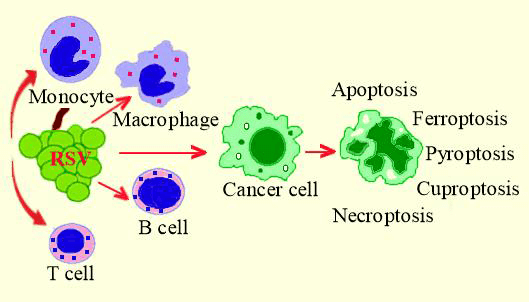 Open Access
Open Access
REVIEW
Immunomodulatory and chemopreventive effects of resveratrol on the digestive system cancers
Laboratory for Immunology and Hematology Research, Rabin Medical Center, Hasharon Hospital, Petah-Tiqva, the Sackler School of Medicine, Tel-Aviv University, Ramat Aviv, 69978, Israel
* Corresponding Author: MEIR DJALDETTI. Email:
Oncology Research 2024, 32(9), 1389-1399. https://doi.org/10.32604/or.2024.049745
Received 17 January 2024; Accepted 23 May 2024; Issue published 23 August 2024
Abstract
Resveratrol (RSV), the primary polyphenol found in grapes, has been revealed to have anti-inflammatory properties by reducing the capacity of the peripheral blood mononuclear cells to produce pro-inflammatory cytokines, including IL-1β, IL-6, IL-1ra and TNFα. Considering the close association between chronic inflammation and cancer development, RSV’s immunomodulatory properties are one way by which the polyphenol may inhibit cancer initiation, proliferation, neovascularization, and migration. Resveratrol influences the generation of microtumor environment which is one of the key factors in cancer progress. In addition to immunomodulation, RSV inhibits cancer development by expressing anti-oxidant effects, causing cell cycle arrest, stimulating the function of certain enzymes, and activating cell signaling pathways. The end outcome is one of the various forms of cell death, including apoptosis, pyroptosis, necroptosis, and more, as it has been observed in vitro. RSV has been shown to act against cancer in practically every organ, while its effects on colon cancer have been documented more frequently. It is remarkable that longer-term clinical studies that may have established the potential for this natural substance to serve as a therapeutic adjuvant to traditional anti-cancer medications were not prompted by the encouraging outcomes seen with cancer cells treated with non-toxic doses of resveratrol. The current review aims to assess the recent findings about the immunological and anti-cancer characteristics of RSV, with a particular emphasis on cancers of the digestive tract, as a challenge for future clinical research that may contribute to the better prognosis of cancer.Graphic Abstract

Keywords
Cite This Article
 Copyright © 2024 The Author(s). Published by Tech Science Press.
Copyright © 2024 The Author(s). Published by Tech Science Press.This work is licensed under a Creative Commons Attribution 4.0 International License , which permits unrestricted use, distribution, and reproduction in any medium, provided the original work is properly cited.


 Submit a Paper
Submit a Paper Propose a Special lssue
Propose a Special lssue View Full Text
View Full Text Download PDF
Download PDF Downloads
Downloads
 Citation Tools
Citation Tools